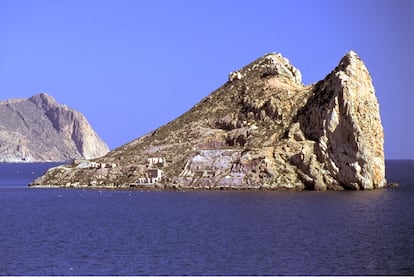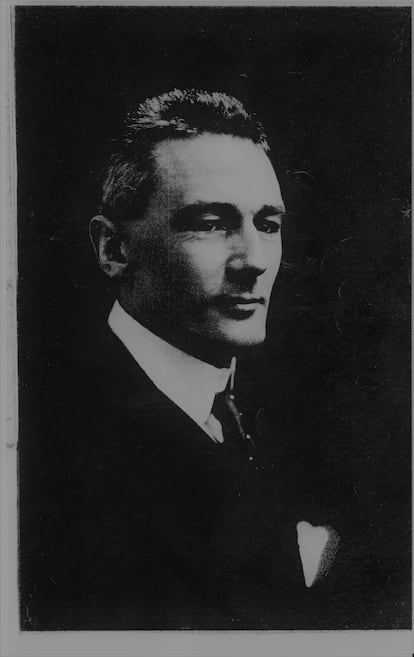The WWI British spy who lived over ancient treasure on a Spanish islet
Hugh Borthwick, the Scot who owned the outcrop of Fraile in the 1910s, ignored the Roman and Islamic vestiges at his feet: he was too busy keeping his eye on passing German warships


At the end of the 19th century, a group of British engineers arrived in Águilas, in the Spanish Mediterranean region of Murcia, in wooden wagons pulled by the steam engines of The Great Southern Spain Railway Company (GSSR). Their objective: to extract iron from the mountains of Los Filabres. The end of the route was Hornillo wharf, where merchant vessels with German, English and neutral flags loaded their holds with the precious cargo, which would prove indispensable in World War I.
In front of the dock lay the tiny island of Fraile, where Scottish aristocrat Hugh Pakenham Borthwick took up residence in 1912. More than 70 years later, in 1983, one of his housemaids, María Abellán Ruiz, left behind a tape recording of herself talking about Borthwick’s daily life on the island where he stayed until 1920, shortly after the end of the war that ravaged Europe.
The outcrop is now being excavated by Murcia University’s Archeology Department and the Archaeological Museum of Águilas. It is hoped that the remains of a monumental building, a Roman settlement and an Islamic necropolis will surface. But Borthwick himself was never actually interested in the archeological aspect of his environment; he was too busy watching the dock where the ships loaded their iron cargos, noting the names of the ships and the color of their flags.

It was María’s grandson, José Asensio, a teacher and contributor to the isabadell.cat news site, who made the recording of María’s childhood memories. The woman, who worked for Borthwick in her early teens along with her mother and grandmother, can be heard to say of the aristocrat that “he had no [direct] relationship with the English community. He lived for his newspaper, his correspondence. He was always reading. He received many letters. But he never kept them. He would destroy them after reading them. He did keep the newspapers. He went to bed very early, always with his revolver under his pillow, but he wasn’t afraid of anything. He never explained to us why he had the gun…”
Historians, witnesses and archived sources all indicate that Borthwick alerted a liaison officer whenever a a ship from Germany or from a neutral country left the area carrying iron ore. The system was well designed: following the alert, the ship in question would be sunk by British submarines. “Although it was rumored that he was a deserter, the truth is that his mission was to spy on the Germans from his privileged position on the Isle of Fraile,” says Asensio.
In 1992, the author Juan Navarro recalled in his book Huellas del pasado (or Footprints from the Past), that “Don Hugo, as he was called by the locals, settled not only on the island but also in the town [of Águilas], in two houses that still stand.”
The British population in Águilas at the beginning of the 20th century was very significant, and their lifestyle had a profound influence on the area. In fact, the English created the first local soccer team, which Borthwick played for: they introduced rugby and tennis and even drove the first car through the streets of the town. They also brought their own architectural style, engineering and, of course, language. “At that time, there were locals in Águilas who didn’t know how to write, but who spoke English because of their daily contact with the foreigners,” explains Juan de Dios Hernández, a local archaeologist.
He went to bed very early, always with his revolver under his pillow, but he wasn’t afraid of anything. He never explained to us why he had the gunMaría Abellán Ruiz, domestic worker
The tiny island of Fraile, which lies just 100 meters from the coast, was owned by the Scottish banker John Gray, who sold it in 1910 to the British Army Lieutenant Colonel Alexander Borthwick, who in turn transferred ownership to his son Hugh, with the overt aim of exploiting its quarry.
The young Borthwick had studied at Oxford where he was recruited by the British secret service and, at the age of 25, with the island in his name, he was already in Águilas preparing to carry out his mission. The Dutch writer Jacqueline Sorel, who is working on a book about Borthwick, explains that he was given the role of spy in Águilas after the Germans rumbled his predecessor. “There was an incident with a German submarine in Cartagena and the agent who preceded him was unmasked,” she says. “Let’s just say that he was no longer useful and the secret service had to replace him quickly.”
According to witness accounts gathered by Asensio, “at a time when poverty was extreme in Águilas, Don Hugo represented the stereotype of an attractive young man. Tall, with blue eyes, he smoked a pipe and always dressed in black, although sometimes he was seen wearing a white suit and hat. His clothes were washed and ironed every day because of his obsession with cleanliness.”
He was always very kind to his staff, which included bodyguards, a chauffeur and servants, and tried to teach them to read and write along with a smattering of English. Although he barely interacted with his compatriots in public, he did receive visits from a number of Brits, “very well-dressed people, wearing jewels and hats, something unimaginable to the locals of Águilas at the beginning of the century. It was a real shock,” says Juan de Dios Hernández.
“He was a good man,” said María Abellán on the tape. “He felt great pity for the poverty he saw and was very fond of the children, giving them significant sums of money for the time. Sometimes he gave them 15 pesetas [9 cents], which was more than some of his own servants earned. That was how news of Don Hugo’s humanity spread, and many poor people came to ask for his help.”
Borthwick disappeared from Águilas as abruptly as he had arrived. He married in England and upon his death in 1950, his wife visited the town and tried to contact his former servants, but many had already died or were unaware she was looking for them.
“Don Hugo deserves to be forever in the street names of Águilas,” says Asensio. “I would like the Hornillo view point [the pier that Borthwick spied on and which is soon to be restored] to bear his name and that the houses on the island where he lived be restored and a permanent exhibition set up.”
All this for the man who watched over the dock and who left the Roman and Islamic archaeological treasure beneath his feet untouched, allowing modern-day archeologists to marvel at it.
English version by Heather Galloway.
Tu suscripción se está usando en otro dispositivo
¿Quieres añadir otro usuario a tu suscripción?
Si continúas leyendo en este dispositivo, no se podrá leer en el otro.
FlechaTu suscripción se está usando en otro dispositivo y solo puedes acceder a EL PAÍS desde un dispositivo a la vez.
Si quieres compartir tu cuenta, cambia tu suscripción a la modalidad Premium, así podrás añadir otro usuario. Cada uno accederá con su propia cuenta de email, lo que os permitirá personalizar vuestra experiencia en EL PAÍS.
¿Tienes una suscripción de empresa? Accede aquí para contratar más cuentas.
En el caso de no saber quién está usando tu cuenta, te recomendamos cambiar tu contraseña aquí.
Si decides continuar compartiendo tu cuenta, este mensaje se mostrará en tu dispositivo y en el de la otra persona que está usando tu cuenta de forma indefinida, afectando a tu experiencia de lectura. Puedes consultar aquí los términos y condiciones de la suscripción digital.








































